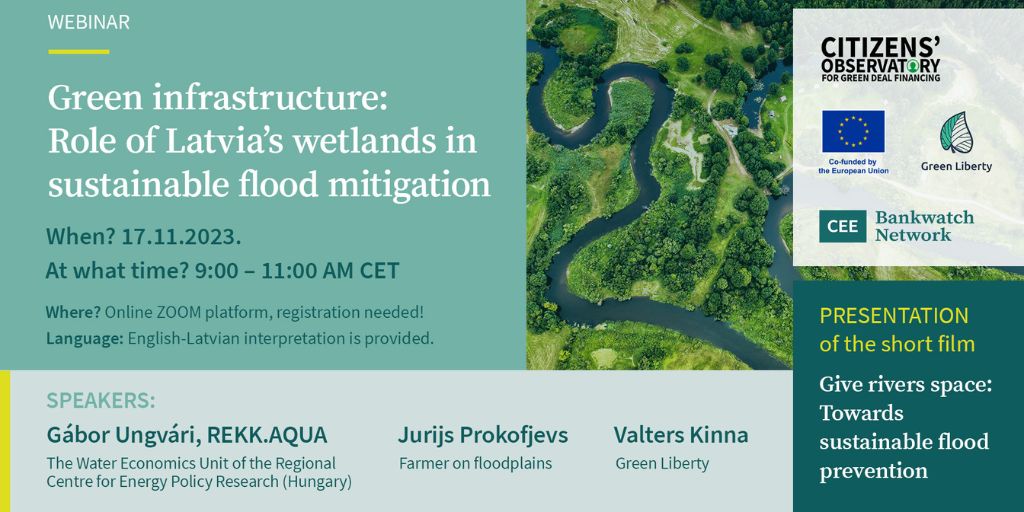
Date: 17 November 2023
On 17 November an online webinar ‘Green infrastructure: The Role of Latvia’s wetlands in sustainable flood mitigation’ took place, where we searched for better ways how people can co-exist with water and how flood risks can be managed sustainably. Although the value of floodplains, natural river meanders, and other wetland ecosystems is now more widely recognized as crucial for water purification and retention during flooding, many EU countries, including Latvia, face significant difficulties in integrating these natural assets into their water management and flood risk mitigation practices.
In Latvia, similarly to the rest of Europe, a significant portion of the land has been drained to create space for human infrastructure, agriculture, and forestry. Historically, more than 90 per cent of Latvia’s floodplains have been lost, and rivers have been channelized. This, however, has often led to the destruction of valuable river habitats, deterioration of wetlands, and problems with water quality due to the accelerated delivery of nutrients and pollution into water bodies. Currently, EU funds are actively being used to dredge long-ago-channelized river sections to restore their drainage capacity.
In this webinar we looked at the problem with fresh eyes, by catching a glimpse of flood mitigation and floodplain management related challenges faced in Latvia and seeing good examples from elsewhere in the EU. The purpose of this event was to foster discussion among various stakeholders as to how flood risk mitigation approaches, practices and the drainage and flood risk related legislation could be improved to follow the most recent scientific and best practice developments with regards to the role and importance of green infrastructure and natural ecosystems as flood water retainers and water purifiers.
The event was promoted through CEE Bankwatch network, Green Liberty’s and Estonian Movement networks. More than 150 people were directly invited. including experts from various flood related fields, civil servants, municipality representatives and others. As a result, 110 participants were present in the webinar from 10 EU countries, including Latvia, Lithuania, Belgium, Hungary, Netherlands and others.
In this webinar:
Presentation: Senior expert from REKK.AQUA, the Water Economics Unit of the Regional Centre for Energy Policy Research (Hungary), shared flood risk mitigation experiences from the project Land4flood, including from examples where flood risk is being reduced by effective use of flood-peak polders, followed by a Q&A. View presentation
Presentation: Manager of a large floodplain territory from Latvia shared the experience of managing vast natural floodplains in Sita Nature Park of the Lubāns Wetland complex (Latvia), a internationally important Natura 2000 site for birds. View presentation
Film discussion: Green Liberty (Latvia) presented the short film “Space for the rivers: Towards sustainable flood prevention”, followed by a Q&A. View short film
Panel discussion: Experts and researchers from the field of water management, flood prevention and wetland restoration met in a short panel discussion, where the main challenges faced by Latvia of achieving the sustainable flood prevention goals were identified and possible solutions discussed. Participants of the panel discussion included Ministry of Environment and Regional development (Water resources unit), Ministry of Agriculture, Latvian Environment, Geology and Meteorology Center and University of Daugavpils.
The panelists highlighted various challenges and barriers faced by the drainage field in Latvia and highlighted the favorable way forward. Most notable of them included:
- the need for change and improvement in existing legislation (to account for wetlands as significant for water retention and drainage)
- the lack of information and research regarding flood retention practices and the role of wetlands in Latvia,
- the need to maintain the existing drainage systems,
- the lack of funding and support for wetland managers with a thought to consider the innovative financing mechanisms, such as flood retention agreements presented by the first speaker – support schemes for landowners used in some places in Austria and other areas, where landowners are willing to offer their land for flood retention in exchange for support from local communities and municipalities affected by flood.
- The need to significantly improve dialogue between national stakeholders (ministries, research institutions, NGOs, landowners and others), by creating a working group, which is already planned to be created in 2024 by the LIFE GOODWATER project.
The recording is available here (in Latvian and English).

This event was organised by NGO Green Liberty and CEE Bankwatch Network within the “Citizens’ Observatory for Green Deal Financing” project, financed by European Education and Culture Executive Agency (EACEA). Views and opinions expressed are however those of the authors only and do not necessarily reflect those of the European Union or the European Education and Culture Executive Agency (EACEA). Neither the European Union nor EACEA can be held responsible for them.
